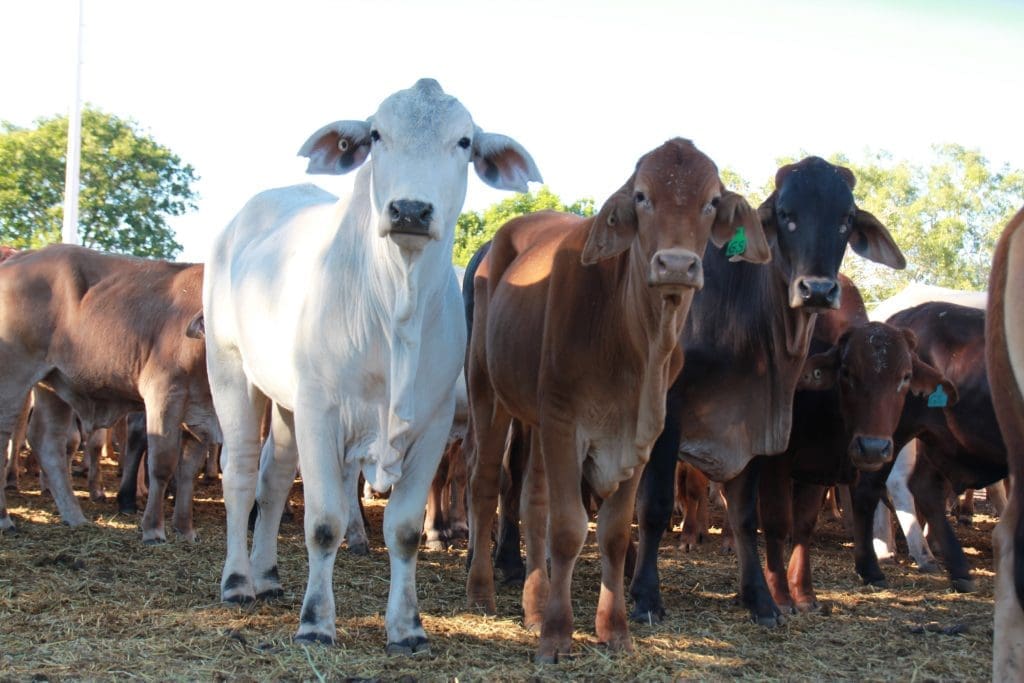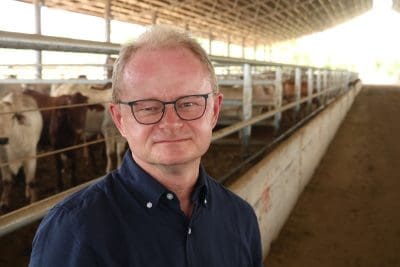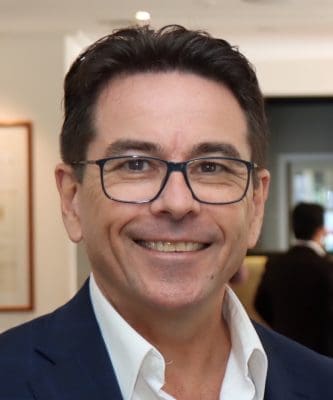THE Australian Government is moving to assure international trading partners that Australia remains free from lumpy skin disease (LSD), after an Indonesian Government agency made the surprise move late on Friday to suspend cattle imports from four Australian pre-export quarantine facilities.
Indonesia’s Agriculture and Quarantine Agency (IAQA) advised Australia’s Department of Agriculture, Fisheries and Forestry (DAFF) late on Friday afternoon that LSD had been detected in a small number of Australian cattle exported to Indonesia, and that it was pausing imports from four Australian trade facilities – two in the NT, one WA and one in Qld – pending further testing of animals.
However, Australia’s chief veterinary officer has moved quickly to point out that the positive results came after the cattle had arrived and spent some time in Indonesia, where LSD was detected and has been spreading since March 2022.
In a statement issued on Sunday Australia’s Chief Veterinary Officer, Dr Mark Schipp, emphasised the fact that lumpy skin disease has never been detected in Australia, and Australia remains free from the disease.
Australia’s Federal Minister for Agriculture Murray Watt also simultaneously released a media releasing restating that Australia has never had a positive detection of LSD.
Dr Schipp said on Sunday evening that live cattle exports to Indonesia are continuing with 28 registered establishments still available for use by exporters wishing to trade.
Dr Schipp said work is already underway to deliver rapid testing and restore exports from the facilities currently paused from trading by Indonesia.
The four yards affected by the current suspensions, which have not been publicly identified, will not be able to export to Indonesia until the suspension is lifted.
Australia’s chief vet said it was not a surprise that Australian cattle could test positive to LSD after arriving in Indonesia, where the disease has become endemic since first being detected in March 2022.
“Given the presence of LSD in Indonesia, positive results in cattle post arrival in Indonesia are not unexpected.
“As Australia remains LSD free, a detection of LSD in another country—such as Indonesia—does not change Australia’s animal health status.
“We have worked closely with our Indonesian colleagues for many years on joint areas of interest such as animal biosecurity. We continue to do so to provide assurance that all animals exported from Australia comply with all Indonesian requirements, including being free of LSD.”
He said Australia has robust biosecurity systems in place for the ongoing monitoring of Australia’s animal disease status including for LSD.
“LSD is a highly infectious viral disease of cattle and buffalo that is transmitted by biting insects —it is not a disease that poses a risk to humans.
“There is no cause for concern for Australian cattle producers as Australia remains LSD free.
“Australia continues to trade livestock products internationally including live cattle to Indonesia.”
Minister Murray Watt said Australian officials are working with Indonesian authorities to reassure them that all animals exported from Australia comply with all Indonesian requirements, including being free of LSD.
 Minister Watt said that after being first briefed about the issue late on Friday afternoon, his Department had taken quick action to protect our cattle industry, including:
Minister Watt said that after being first briefed about the issue late on Friday afternoon, his Department had taken quick action to protect our cattle industry, including:
- Immediately activating the Response Coordination Group.
- Holding briefings with State and Territory Ministers and their respective Chief Veterinary Officers.
- Met with Australia’s Ambassador to Indonesia and other departmental officers who are on the ground in Jakarta.
- Holding a briefing with more than 70 industry stakeholders.
- Begun the process of rapid diagnostic testing of cattle across Northern Australia.
“Indonesia is a valued and respected partner, and Australia recognises the longstanding cooperation with Indonesia on animal biosecurity matters.
“Australian producers and our beef supply chain can be assured that we are working around the clock to get a swift resolution to this issue.”
Cattle Australia: Testing underpins confidence in our disease free status
Cattle Australia CEO Luke Bowen told Beef Central on Sunday evening that the Australian cattle industry peak body is supporting the role of Australia’s chief veterinary officer in working to reassure Indonesia and Australia’s international markets and trading partners of Australia’s disease-free status.
He said Australia’s significant testing across northern Australia, which had increased since the outbreak of LSD in Indonesia last year, meant Australia was very confident in relation to its disease-free status.
“The northern network has really mobilised to monitor and test cattle across the north.
“We have certainly been very fortunate that our disease status remains free.
“Obviously working with Indonesia very closely is critical to provide them with what they require for those reassurances they need in relation to our ongoing trade.”
Asked if it was unusual for Australia to receive a notification in this manner, Mr Bowen said it came as a surprise to receive the announcement that some Australian facilities would be temporarily suspended from operating into the Indonesia export market.
“But predominantly the trade continues with the need for those facilities to do a some testing,” he said.
“They (Indonesia) are also wanting to ensure that our end of the supply chain the testing is being undertaken.
“So certainly the northern vets, the chief veterinary officers and the national veterinary officer are working on scaling up some of the surveillance and testing operations and obviously in facilities also that are involved in the export side, scaling up those operations to make sure it is satisfying the requirements of Indonesia and to answer any questions they may have.
Mr Bowen said the relationship between Australia and Indonesia was extremely important and “goes back a long way”.
“It is a very deep and very important relationship, culturally, socially and economically and this is something that we really value, the relationship with Indonesia.
“It has been a trade that has developed over a number of decades, it is a really beneficial trade that benefits both the Northern Territory and northern Australia, and it also benefits Indonesia.
“It is one of those very symbiotic relationships that is really worth investing in, and this is just a good example of Australia working very closely with Indonesia to ensure that we are working hand in glove in order to make sure we’re meeting our mutual requirements.”
David Littleproud: “Calm” approach needed
Nationals leader and Opposition agriculture spokesperson David Littleproud said there was strong reason to be confident that Australia does not have lumpy skin disease and pointed to the fact that the small number of Australian cattle which tested positive to LSD in Indonesia had been in yards in Indonesia for a number of days.
“So I think it’s important that we demonstrate that with science, that we give our trading partners that certainty.
“I think we need to create that environment for the department to be able undertake that. But I’m very confident in our science. I’m very confident in our biosecurity measures, that they will stand the test of time in this one and that we’ll be able to resume trade out of those four facilities in the coming weeks.”
Cattle Australia statement:
Cattle Australia also released the following public statement to its members on Sunday evening:
In recent weeks 13 cattle have returned positive results for LSD when tested a number of days after arrival in Indonesia.
Lumpy Skin Disease does not pose a risk to human health.
It is important to reaffirm that Australia remains LSD-free, confirmed by extensive testing and surveillance across Northern Australia since the detection of LSD in Indonesia in 2022. The robust systems that Australia has for the ongoing monitoring of our animal disease status support us to trade globally.
Further surveillance and testing continue across the northern cattle industry conducted by private and government vets with all testing over the past 12 months showing negative results.
The industry and the states and territories are working closely with the Australian Government to provide the assurances sought by Indonesia’s authorities.
We respect the right of Indonesia’s technical authorities to seek relevant assurances that live cattle exported from Australia comply with their animal health requirements. This includes being free of LSD.
The Australian cattle industry has a long and deep relationship with Indonesia. This relationship remains critical to Northern Australia and our region underpinning strong economic, social and cultural ties.
Cattle Australia is continuing to work with the Australian government, the Australian Chief Veterinary Officer Mark Schipp, the Australian Agriculture Minister, and our overseas diplomatic post in Indonesia.
For further information please visit the Department of Agriculture, Fisheries and Forestry at: https://www.agriculture.
Regards
Luke Bowen
CEO, Cattle Australia



